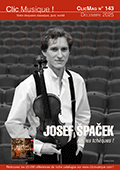|
|
|
Format : 1 CD
Durée totale : 00:55:20
Prise de son : Stereo
Label : Stradivarius
Référence : STR37332
EAN : 8011570373328
Code Prix : DM019A
Année d'édition : 2025
Date de sortie : 02/07/2025
Genre : Classique
|
|
 |
Hieronymus Weickmann (1825-1895)
Nachtlied, op. 4
Wiegenlied, op. 4Franz Liszt (1811-1886)
Romance oubliée, S 132Gabriel Fauré (1845-1924)
Elégie, op. 24Claude Debussy (1862-1918)
Beau soir, L 84Alexandre Glazounov (1865-1936)
Elégie, op. 44Johann Wenzel Kalliwoda (1801-1866)
Six Nocturnes, op. 186
Federica Cardinali, alto
Lisa Redorici, piano
|
 
 Ce récital pour alto et piano est centré sur des œuvres au climat fortement introspectif, entre humeur romantique et atmosphère impressionniste. Il commence par une première au disque : l’opus 4 du compositeur russe d’ascendance allemande Hieronymus Weickmann, qui comporte deux pièces dédiées à la nuit. Les quatre pièces qui suivent sont nettement plus connues, tout comme leurs compositeurs : Liszt, Fauré, Debussy, Glazounov. Ce sont des compositions au lyrisme chaleureux, qui sont bien aimées des récitals pour alto et piano. Pour finir, le récital revient à un programme plus rare, puisqu’il propose les très peu enregistrés Six Nocturnes op. 186 du compositeur tchèque Johann Wenzel Kalliwoda. Dans ce cycle, davantage de contrastes et de versatilité se font jour, même si c’est toujours au sein d’une esthétique de l’intimité. Ce récital propose donc un programme qui a le mérite d’être original et dont l’écoute serait très agréable si l’intonation de l’altiste Frederica Cardinali était plus assurée. (Emmanuel Lacoue-Labarthe)  It is a rather widespread opinion that the genesis of musical compositions intended to positively impress the listener’s soul is often connected to an initial illumination that expands within a creative process that is per se rather ordinary. It is that creative spark constituting the generating principle which, as it unfolds, gives form and narrative cohesion to the sound archetype. This is the premise underlying the album by the duo Cardinali-Redorici, the realisation of a project that presents itself as a refined exploration of soundscapes delineated by the poietic encounter between viola and piano, through a dialogue aimed at capturing the most varied emotional nuances. In the panorama of string instruments, the viola is characterised by a highly suggestive timbral eloquence stemming from the range of frequencies within which it moves – an extension that makes it possible to perceive, at opposite extremes, sensations of both a lyrical luminosity typical of the violin and dark tones attributable to the gravitas of the cello. This contributes to making this medium ideal for translating into sound an expressiveness of musical thought drawing its quintessence from a persistent search for intimacy, oscillating between lightness and depth. In this sense, the listener of InCanto Notturno is projected into an intense and exciting sound journey – ranging from the exploration of affections ascribable to a certain romantic lyricism to the stylistic refinement typical of Impressionism –, also reaching suggestive incursions into less beaten territories of the repertoire with the proposal of rarely performed compositions.
 |
| . |
 |
|
|
